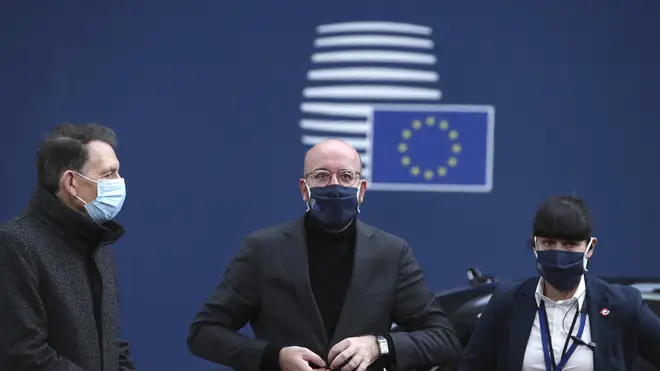
Nick Ferrari 7am - 10am
10 December 2020, 18:54

The 1.82 trillion-euro long-term budget and recovery package is considered vital for many European countries.
European Union leaders have sealed an agreement on a massive long-term budget and coronavirus recovery package, EU Council president Charles Michel has said.
The deal was agreed at an EU summit in Brussels despite objections from Hungary and Poland.
“Now we can start with the implementation and build back our economies. Our landmark recovery package will drive forward our green and digital transitions,” Mr Michel said in a tweet.
Deal on the #MFF and Recovery Package #NGEU
Now we can start with the implementation and build back our economies.
Our landmark recovery package will drive forward our green & digital transitions. #EUCO
— Charles Michel (@eucopresident) December 10, 2020
The 1.82 trillion-euro long-term budget and recovery package is considered vital for many European countries whose economies have been devastated by the virus.
Poland and Hungary had agreed to the deal in July but later vetoed it over a new mechanism that would allow Brussels to cut off EU funds to countries that violate Europe’s democratic standards.
The breakthrough came just days after it appeared that Poland and Hungary’s 25 EU partners might go it alone and create a new coronavirus recovery package without them.
Ahead of the two-day summit, EU diplomats and officials said the solution would take the form of a declaration clarifying that the rule of law mechanism would not be used against any country without a ruling from the EU’s top court, the European Court of Justice, first. That process could take a year.
Hungarian Prime Minister Viktor Orban said that all sides were fighting for ”a victory for common sense”.

“It is obvious that when our nations and so many millions of people are in real need because of (the) pandemic and the economic consequences of that, we have to behave reasonably,” said Mr Orban, whose nationalist government, like Poland’s, has been accused of undermining judicial independence and media freedoms.
But Dutch Prime Minister Mark Rutte said he still had questions about the compromise, like his neighbours in Belgium and Luxembourg.
He had planned to seek legal advice, particularly as to whether the compromise would violate the agreement previously reached between EU member countries and the European Parliament.
Mr Rutte said he also wanted to be sure that any court ruling “can retroactively establish that violations have occurred”.

Luxembourg Prime Minister Xavier Bettel said it was normal for Hungary and Poland to want to have judicial review.
“But nothing must change in the rules. Nothing. If we start diluting, or to say that we don’t care about values or justice; no. If we want rule of law we must have a mechanism that works,” Mr Bettel said.
Daniel Freund, the Green group negotiator on the rule of law in the European Parliament, warned that the compromise being discussed would put the system “on hold for one-two years.”
“Europe’s rule of law is in crisis,” he said, adding that EU members should not be pressing the European Commission to avoid enforcing “existing laws while judicial independence is abolished in Poland or billions of EU funds end up with Orban’s family and friends”.
Had the leaders failed to adopt the budget for 2021-2027 before the end of the year, the bloc would have been forced to function on limited resources, with a maximum of one-12th of the budget for the previous financial year to be spent each month.
Many projects for Poland and Hungary — which are already being formally investigated by the EU for their potential violations of the rule of law — would have been held up.